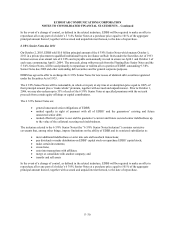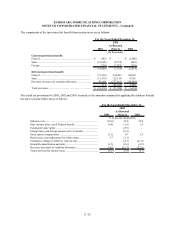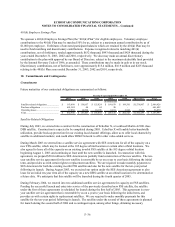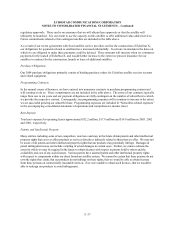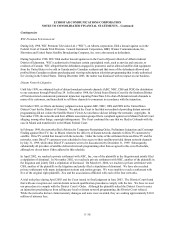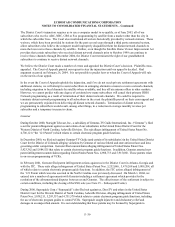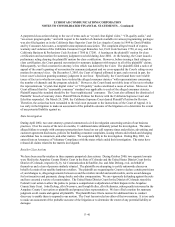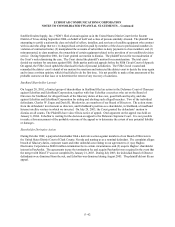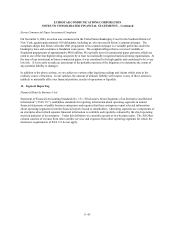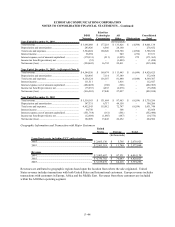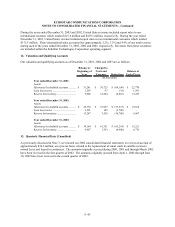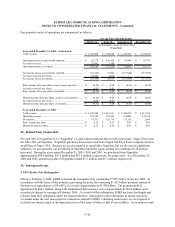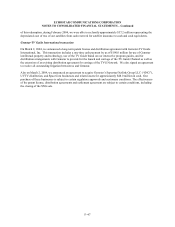Dish Network 2003 Annual Report Download - page 107
Download and view the complete annual report
Please find page 107 of the 2003 Dish Network annual report below. You can navigate through the pages in the report by either clicking on the pages listed below, or by using the keyword search tool below to find specific information within the annual report.ECHOSTAR COMMUNICATIONS CORPORATION
NOTES TO CONSOLIDATED FINANCIAL STATEMENTS – Continued
F–40
Gemstar. Gemstar was added as a party to this case and asserted these patents against us. We examined these patents
and believe that they are not infringed by any of our products or services. A Markman ruling interpreting the patent
claims was issued by the Court and in response to that ruling, we filed motions for summary judgment of non-
infringement for each of the asserted patents. Gemstar filed a motion for summary judgment of infringement with
respect to one of the patents. During July 2002, the Court issued a Memorandum of Opinion on the summary judgment
motions. In its Opinion, the Court ruled that none of our products infringe the 5,038,211 and 5,293,357 patents. With
respect to the 4,751,578 patent, the Court ruled that none of our current products infringed that patent and asked for
additional information before it could rule on certain low-volume products that are no longer in production. During
July 2002, the Court summarily ruled that the aforementioned low-volume products did not infringe any of the asserted
patents. Accordingly, the Court dismissed the case and awarded us our court costs and the case was appealed to the
United States Court of Appeals for the Federal Circuit. On February 12, 2004, the Federal Circuit affirmed in part and
reversed in part the District Court’s findings and remanded the case back to the District Court for further proceedings.
We will continue to vigorously defend this case. In the event that a Court ultimately determines that we infringe on any
of the aforementioned patents, we may be subject to substantial damages, which may include treble damages and/or an
injunction that could require us to materially modify certain user-friendly electronic programming guide and related
features that we currently offer to consumers. It is not possible to make a firm assessment of the probable outcome of
the suit or to determine the extent of any potential liability or damages.
Broadcast Innovation, LLC
In November of 2001, Broadcast Innovation, LLC filed a lawsuit against EchoStar, DirecTV, Thomson Consumer
Electronics and others in Federal District Court in Denver, Colorado. The suit alleges infringement of United States
Patent Nos. 6,076,094 (“the ‘094 patent”) and 4,992,066 (“the ‘066 patent”). The ‘094 patent relates to certain
methods and devices for transmitting and receiving data along with specific formatting information for the data.
The ‘066 patent relates to certain methods and devices for providing the scrambling circuitry for a pay television
system on removable cards. We examined these patents and believe that they are not infringed by any of our
products or services. Subsequently, DirecTV and Thomson settled with Broadcast Innovation leaving EchoStar as
the only defendant. On January 23, 2004, the judge issued an order finding the ‘066 patent invalid as being
indefinite in violation of 35 U.S.C. Sec. 112. Motions with respect to the infringement, invalidity and construction
of the ‘094 patent remain pending. We will continue to vigorously defend this case. In the event that a Court
ultimately determines that we infringe on any of the aforementioned patents, we may be subject to substantial
damages, which may include treble damages and/or an injunction that could require us to materially modify certain
user-friendly features that we currently offer to consumers. It is not possible to make a firm assessment of the
probable outcome of the suit or to determine the extent of any potential liability or damages.
TiVo Inc.
In January of 2004, TiVo Inc. filed a lawsuit against us in the United States District Court for the Eastern District of
Texas. We have not yet filed our answer. The suit alleges infringement of United States Patent No. 6,233,389 (“the
‘389 patent”). The ‘389 patent relates to certain methods and devices for providing what the patent calls “time-
warping”. We have examined this patent and do not believe that it is infringed by any of our products or services.
We intend to vigorously defend this case. In the event that a Court ultimately determines that we infringe this
patent, we may be subject to substantial damages, which may include treble damages and/or an injunction that could
require us to materially modify certain user-friendly features that we currently offer to consumers. It is not possible
to make a firm assessment of the probable outcome of the suit or to determine the extent of any potential liability or
damages.
California Actions
A purported class action was filed against us in the California State Superior Court for Alameda County during
2001 by Andrew A. Werby. The complaint related to late fees, among other things. The matter was settled with no
material impact on our business.


